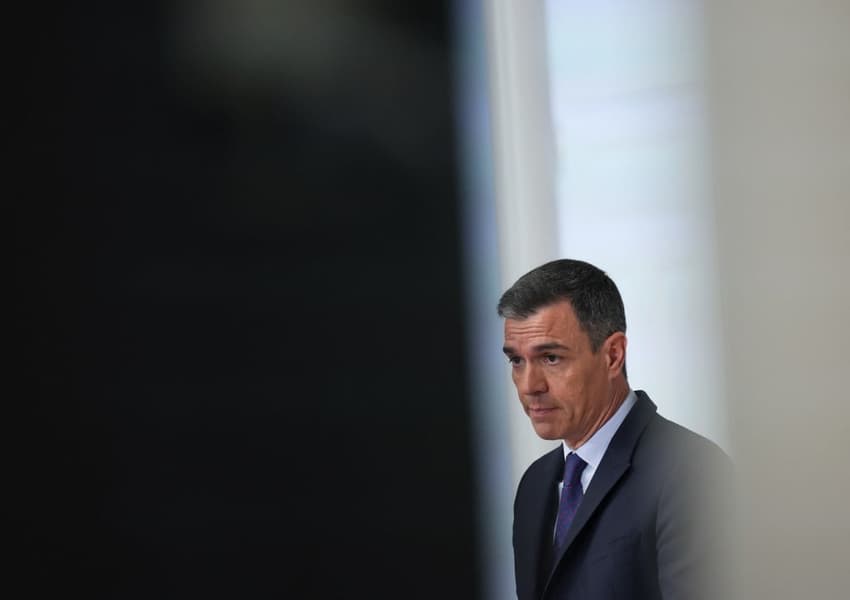Despite divisions, Spain's hard-left unites for vote

Spain's hard-left decided Friday to join forces on a single political platform for the July 23rd elections, in a boost for Socialist Prime Minister Pedro Sánchez's reelection hopes.
The decision was announced shortly before a midnight deadline for parties to register their intention to run as part of a coalition, although they are not required to provide any individual names until June 19th.
The snap election was called by Sánchez on May 29th, a day after his Socialists and their hard-left coalition partner Podemos suffered a drubbing in local and regional elections.
Since then, Labour Minister Yolanda Díaz has been pushing to rally the hard-left behind her platform Sumar ("Unite").
READ ALSO: Collapse of Spain’s far-left complicates vote for Sánchez
After days of difficult negotiations, Podemos, which grew out of the anti-austerity "Indignados" protest movement, finally agreed to join the coalition, which includes more than a dozen political groupings.
"This is the broadest agreement ever reached in Spanish democratic history between progressive and ecological forces," said a statement from Sumar Friday night.
READ ALSO: A foreigner's guide to understanding Spanish politics in five minutes
Podemos, once Spain's third largest political force in 2015, entered a coalition government with the Socialists in 2020.
But since then, the party's appeal has been much diminished by a string of disputes and controversies, and its support collapsed during the May 28 local and regional elections.
READ ALSO: Who won where in Spain's regional elections?
From Sumar's perspective, one of the main sticking points in the talks with Podemos had been the role of Equality Minister Irene Montero, the party's best-known figure.
Some Díaz allies did not want her on the list, and in the end, she was left out.
An outspoken hardliner who has often courted controversy, Montero has faced bitter criticism in recent months, notably over her flagship rape law that paradoxically let some offenders reduce their sentences.
READ ALSO: Spain sees no risk to EU presidency from July snap election
Earlier Friday, Podemos leader Ione Belarra called for the veto on Montero to be lifted, describing it as "not only an injustice but also a serious political error".
Polls have long tipped the right-wing Popular Party to win next month's vote, although, without a majority, it would be forced to rely on the far-right Vox to govern.
But the coming together of Spain's hard-left offers Sánchez's Socialists the hope of pulling together a minority government that could rule with the backing of several regional parties.
Comments
See Also
The decision was announced shortly before a midnight deadline for parties to register their intention to run as part of a coalition, although they are not required to provide any individual names until June 19th.
The snap election was called by Sánchez on May 29th, a day after his Socialists and their hard-left coalition partner Podemos suffered a drubbing in local and regional elections.
Since then, Labour Minister Yolanda Díaz has been pushing to rally the hard-left behind her platform Sumar ("Unite").
READ ALSO: Collapse of Spain’s far-left complicates vote for Sánchez
After days of difficult negotiations, Podemos, which grew out of the anti-austerity "Indignados" protest movement, finally agreed to join the coalition, which includes more than a dozen political groupings.
"This is the broadest agreement ever reached in Spanish democratic history between progressive and ecological forces," said a statement from Sumar Friday night.
READ ALSO: A foreigner's guide to understanding Spanish politics in five minutes
Podemos, once Spain's third largest political force in 2015, entered a coalition government with the Socialists in 2020.
But since then, the party's appeal has been much diminished by a string of disputes and controversies, and its support collapsed during the May 28 local and regional elections.
READ ALSO: Who won where in Spain's regional elections?
From Sumar's perspective, one of the main sticking points in the talks with Podemos had been the role of Equality Minister Irene Montero, the party's best-known figure.
Some Díaz allies did not want her on the list, and in the end, she was left out.
An outspoken hardliner who has often courted controversy, Montero has faced bitter criticism in recent months, notably over her flagship rape law that paradoxically let some offenders reduce their sentences.
READ ALSO: Spain sees no risk to EU presidency from July snap election
Earlier Friday, Podemos leader Ione Belarra called for the veto on Montero to be lifted, describing it as "not only an injustice but also a serious political error".
Polls have long tipped the right-wing Popular Party to win next month's vote, although, without a majority, it would be forced to rely on the far-right Vox to govern.
But the coming together of Spain's hard-left offers Sánchez's Socialists the hope of pulling together a minority government that could rule with the backing of several regional parties.
Join the conversation in our comments section below. Share your own views and experience and if you have a question or suggestion for our journalists then email us at [email protected].
Please keep comments civil, constructive and on topic – and make sure to read our terms of use before getting involved.
Please log in here to leave a comment.